The latest edition of AIG News, the Australian Institute of Geoscientists member newsletter is now available in full colour and digital format and best of all FREE for all readers!
Now all AIG Members and Non Members can enjoy our FREE AIG Newsletter in digital format, including all previous editions. Please click here to see our archive of AIG News.
Download the latest copy of AIG News 126 below:
![]() For web: AIG News 126: Download as Single Pages PDF
For web: AIG News 126: Download as Single Pages PDF
![]() For web: AIG News 126: Download as Double Page Spread PDF
For web: AIG News 126: Download as Double Page Spread PDF
![]() For print: AIG News 126: Download as Single Pages PDF
For print: AIG News 126: Download as Single Pages PDF
![]() For print: AIG News 126: Download as Double Page Spread PDF
For print: AIG News 126: Download as Double Page Spread PDF
Inside this latest issue…
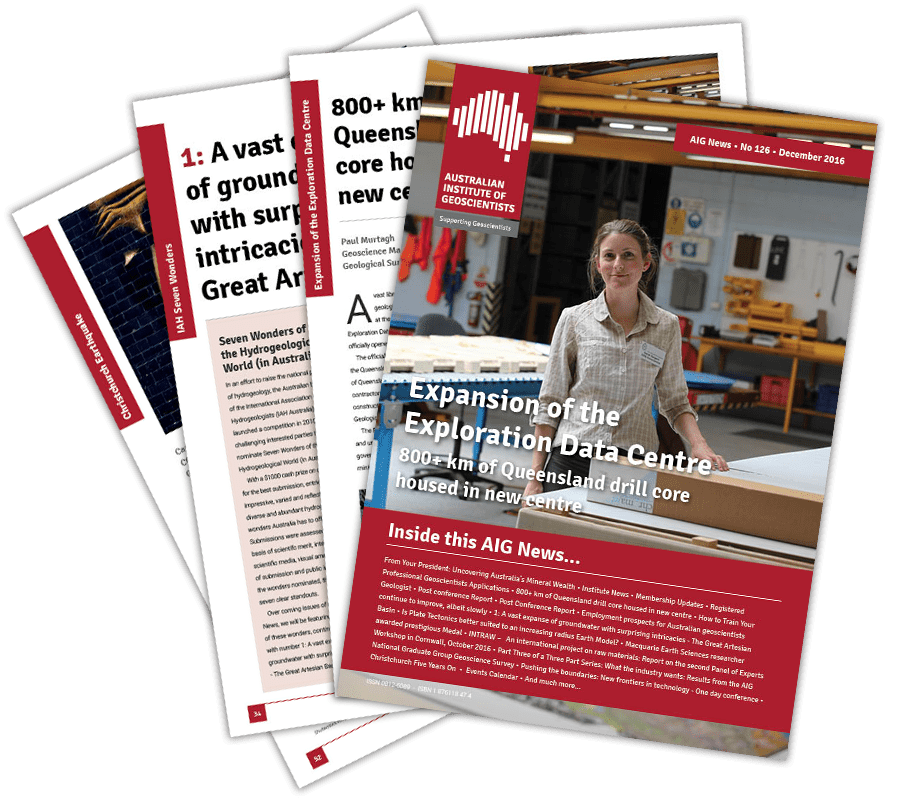 From Your President: Uncovering Australia’s Mineral Wealth; Institute News; Membership Updates; Registered Professional Geoscientists Applications; 800+ km of Queensland drill core housed in new centre; How to Train Your Geologist; Post conference Report; Post Conference Report; Employment prospects for Australian geoscientists continue to improve, albeit slowly; 1: A vast expanse of groundwater with surprising intricacies – The Great Artesian Basin; Is Plate Tectonics better suited to an increasing radius Earth Model?; Macquarie Earth Sciences researcher awarded prestigious Medal; INTRAW – An international project on raw materials: Report on the second Panel of Experts Workshop in Cornwall, October 2016; Part Three of a Three Part Series: What the industry wants: Results from the AIG National Graduate Group Geoscience Survey; Pushing the boundaries: New frontiers in technology – One day conference; Christchurch Five Years On; Events Calendar; And much more…
From Your President: Uncovering Australia’s Mineral Wealth; Institute News; Membership Updates; Registered Professional Geoscientists Applications; 800+ km of Queensland drill core housed in new centre; How to Train Your Geologist; Post conference Report; Post Conference Report; Employment prospects for Australian geoscientists continue to improve, albeit slowly; 1: A vast expanse of groundwater with surprising intricacies – The Great Artesian Basin; Is Plate Tectonics better suited to an increasing radius Earth Model?; Macquarie Earth Sciences researcher awarded prestigious Medal; INTRAW – An international project on raw materials: Report on the second Panel of Experts Workshop in Cornwall, October 2016; Part Three of a Three Part Series: What the industry wants: Results from the AIG National Graduate Group Geoscience Survey; Pushing the boundaries: New frontiers in technology – One day conference; Christchurch Five Years On; Events Calendar; And much more…
AIG News is optimised to be read with Adobe Reader. Versions are available for printing (with Adobe Reader version 4.1.3 or later) or either reading on-line or downloading for reading off-line with your laptop or tablet (with Adobe Reader version 6.1.5 or later). Both versions have been tested and are compatible with Apple Preview and iBooks for Mac and iPad users.
If you experience any difficulty accessing and reading AIG News using the Adobe Reader versions listed here technical support is available.
We hope that you enjoy the latest AIG News and welcome your feedback.
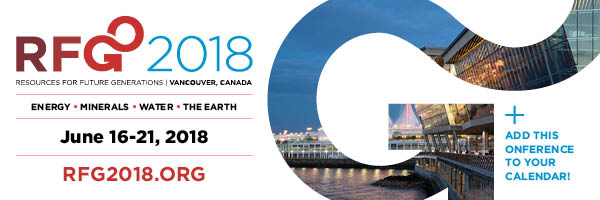
Grounded in geoscience, Resources for Future Generations 2018 will serve as a forum for industry, government, academia and other stakeholders to discuss their research as well as the key issues and trends shaping the future delivery of energy, minerals and water resources within the context of sustainable development.


John F.H. Thompson Chair, RFG2018 Steering Committee
RFG2018 is the first IUGS conference to be held between Quadrennial IUGS International Geological Congresses and the first to be focused on a specific topic, Resources for Future Generations. Under this topic, there will be three major themes – Energy, Minerals and Water, with an additional theme broadly related to the Earth and the knowledge that underpins the future availability and responsible use of resources.
We expect to attract 4000-5000 attendees including earth scientists and engineers involved in research and resource development, members of government and civil society focused on resource management, and First Nations and indigenous people interested in resources. We are especially keen to attract young professionals, researchers and students who represent the future generation – the topic of the conference. In addition to a full technical program with plenary, oral and poster sessions, there will be pre- and post-conference short courses, workshops and field trips.
The conference will be held on 16-21 June 2018 in Vancouver in the Province of British Columbia on Canada’s west coast. Vancouver is a magnificent city located in a beautiful setting surrounded by mountains and the Pacific Ocean, Canada’s gateway to Asia and other Pacific nations. Vancouver is renowned for being a friendly, cosmopolitan and entertaining city. It is also an appropriate location for RFG2018, since the extraction and environmental management of energy, minerals and water are integral to the success of British Columbia.
Find out more about the conference or download the conference brochure.
A Call for Sessions under the technical and non-technical themes and sub-themes is now open. Proposals will be accepted until the fall 2016. Session ideas that depart from these themes, provided that they are relevant to the conference, will be considered. Click here for more information.
Proposals will be accepted until February 2017.
This joint venture is estimated to attract 4,000 to 5,000 scientists, policy-makers, industry representatives and members of civil society.

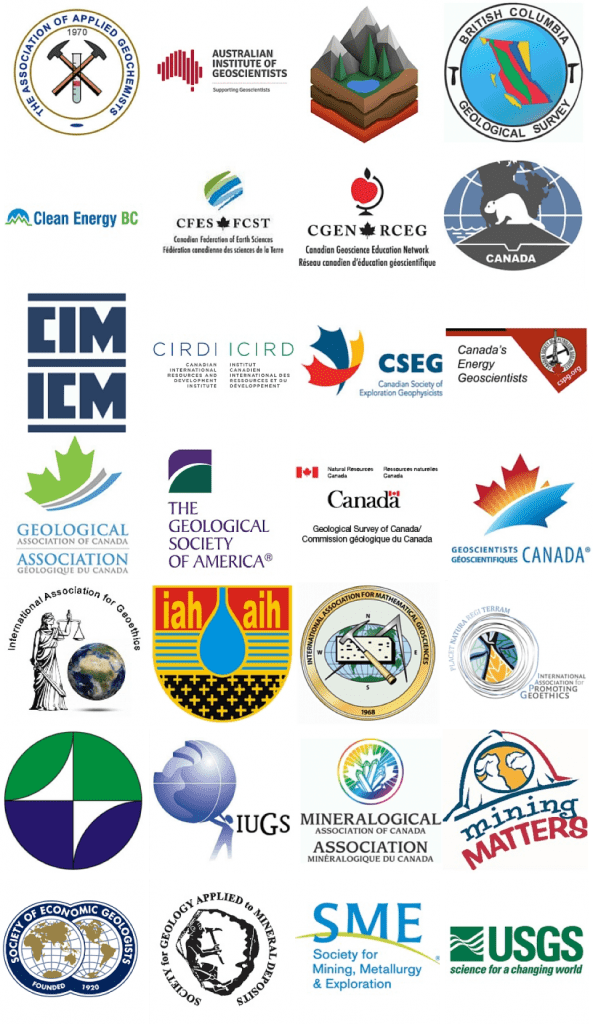
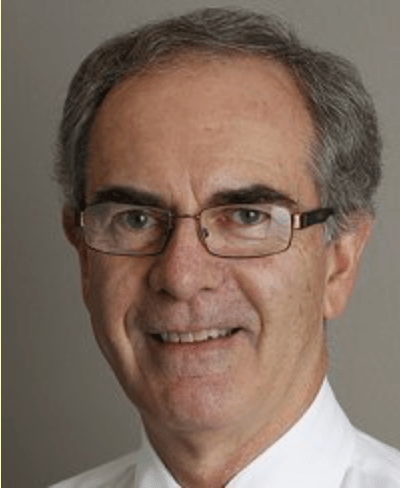
Current AGC President and former AIG President, Bill Shaw
The AGC has continued to be very active in advocating geoscience in Australia throughout 2016.
A brief summary of our recent achievements follows before some exciting news about our AGC Convention to engage with all geoscientists in Australia and our Region. But first our activities:
We provided a submission to the National Review Of Research Infrastructure and also promoted the views of AuScope, UNCOVER and the Australian Academy of Science National Committee of Earth Sciences, which also made submissions.
We are supporting the Geological Society of Australia (GSA) initiative on Geotourism with a matching contribution of funds for an economic feasibility study on the Warrumbungle UNESCO Global Geopark proposal. This will be a benchmark study and will provide a template for proposals for other Geotourism projects in Australia. We see Geotourism as an important way for the community to engage with their local rocks, and potentially a way of creating opportunities for geoscientists. The GSA’s information is at http://bit.ly/Geotourism. Incidentally there was a successful ‘geo-cultural’ tour recently of Sydney’s iconic (and aptly named) Rocks District.
The AGC has been attending meetings to help develop the Decadal Plan for Earth Sciences in Australia. We see this primarily as a value proposition document to promote future benefits from investment in geoscience. By focusing on the Education and Advocacy sections of this document we consider it will promote the importance of Geoscience and the knowledge we derive from rocks as part of an integrated Earth Sciences strategy.
The AGC Strategic Plan was presented at the 35th International Geoscience Congress in Cape Town, South Africa in August. This provided an opportunity to engage with other like-minded organisations around the world and start to understand how we can all interact, support various initiatives, and learn from our shared successes. The presentation that I gave is available here.
We developed a Media Blitz for this year’s Earth Science Week in October with three main themes. The first was #OzRockStocktake, the photographic outreach event which many of you participated in. Results were very pleasing and can be found by using the hashtag to search Google, Facebook and/or Twitter. We also unveiled a new addition to the National Rock Garden in Canberra, being a piece of Moruya granite from the quarry that provided the dimension stone for the Sydney Harbour Bridge pylons. And finally, we urged our Federal and State Governments to support the UNCOVER initiative to find the ‘next generation’ of hidden mineral deposits in Australia, as these will sustain Australia’s high level of economic prosperity and resource security. These three media releases achieved considerable penetration into Government at all levels. They can be found on the AGC web site.
We have provided some support to the programs developed by Ms Suzy Urbaniak of Kent Street Senior High School and we are pleased to note here that she was awarded the 2016 Prime Minister’s Prize for Excellence in Science Teaching in Secondary Schools. I congratulated Suzy formally by letter (and informally of course). We know she is a great resource for others who want to emulate her successful engagement of students and the community.
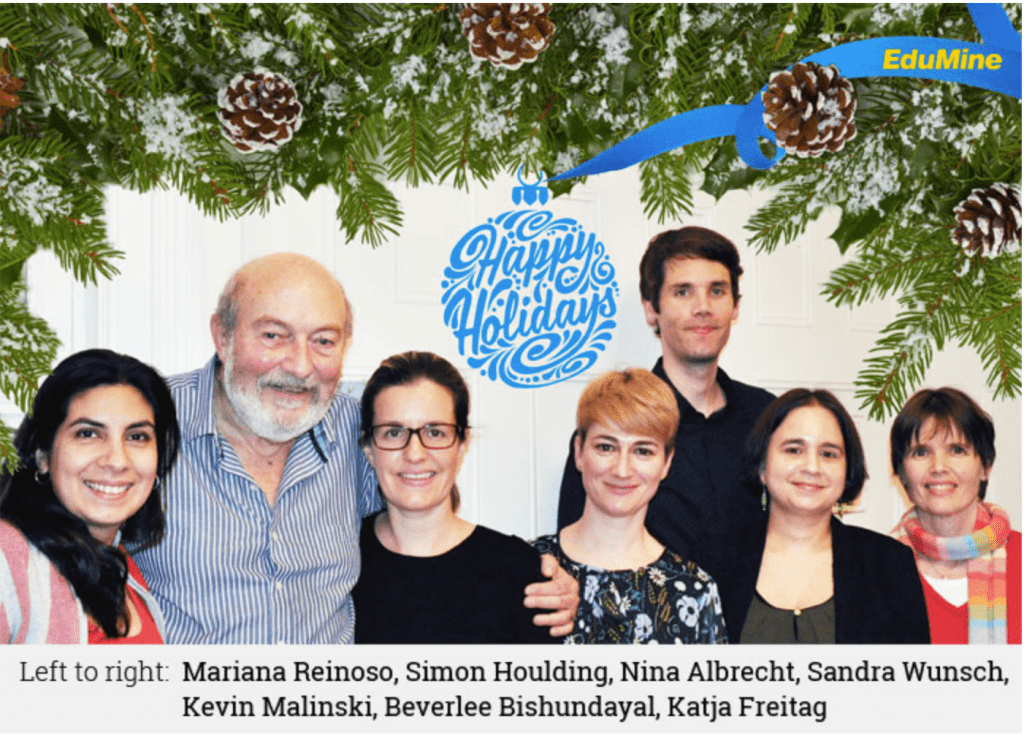
A growing number of AIG members are taking advantage of the excellent continued professional development opportunities available through AIG’s dedicated Edumine Campus.
AIG EduMine Campus that will provide members with access to an extensive range of continued professional development (CPD) resources in the form of structured learning programs, able to be undertaken by members on-line, anywhere, at any time.
Members will also receive discounts on seminars streamed live from several locations around the world that provide participants with the opportunity to interact, in real time, with other participants and the course leader.
Members are offered the opportunity to subscribe to the campus through AIG’s membership management system each year, with the annual membership renewal notices. It’s possible, however, to subscribe at any time via the AIG Membership portal.
AIG is committed to providing members with high quality, affordable professional development opportunities, of which the Edumine campus forms an important part. If you have never looked at Edumine, the coming holiday season provides a great opportunity to become familiar with the depth and breadth of courses on offer.


Current AGC President and former AIG President, Bill Shaw
With the support and commitment of AIG and seven other member organisations the Australian Geoscience Council is developing the AGC Convention 2018 (AGCC 2018), to be held in Adelaide during Earth Science Week.
Planning is underway with the recent appointment of a Professional Conference Organiser, finalisation of the venue and formation of the Organising Committee. Dr Chris Yeats will Chair the Technical & Scientific Program Subcommittee and various other Subcommittee Chairs are currently being appointed.
The purpose is to promote Geoscience as a major and essential field of Science in Australia. Geoscience plays a fundamental part in every Australian’s life; it constitutes our immediate environment, and provides many of the materials we use everyday.
The convention will provide an opportunity for geoscientists from Australasia to come together to discuss and promote all aspects of Geoscience and to gain valuable professional development from an engaging program of high-quality technical content. The Australian Geoscience Council (AGC) will host this forum and our Member Societies will be encouraging leading geoscientists from Australia, New Zealand and further afield to share their knowledge and experiences in the many diverse aspects of Geoscience. A number of Keynote Speakers of international repute have already expressed interest in championing some themes. A strong media presence will be there to focus attention on the issues and potential solutions facing Australian Geoscience.
The convention is expected to cover all aspects of Geoscience. The proposed topics are wide-ranging, potentially covering science and technology, mineral and energy resources, sustaining our environment and supporting our people, the impact of Geoscience on society and ways of educating everyone about Geoscience.
The Australian Geoscience Council Convention in 2018 is the inaugural forum for bringing together Geoscience professionals from all Member Societies of the AGC to showcase their part in Geoscience for the 21st Century. The compelling reason for doing this is to develop broad cooperation, synergies and strong linkages between industry and academia, researchers and practitioners, educators and community stakeholders wishing to further their understanding. By developing the big picture for Geoscience in our Region we will ensure that our important science has a strong future and we can maximise the benefit of our common field of endeavour for all Australians.
The proposed Technical Sessions are:
We expect that Technical Session 5 will include sessions engaging with the broader community interested in Geoscience including:
Running across these Technical Sessions we plan to have a number of half-day Thematic Sessions. The overall plan is to engage with as many presenters, speakers and attendees as possible. To do this we have planned an innovative approach with extensive use of electronic resources and poster presentations.
If you are interested in providing a paper, helping develop a Technical Session or championing a Thematic Session please contact any of the following:
Dr Chris Yeats – Scientific and Technical Program Convenor
chris.yeats@industry.nsw.gov.au
Dr Bill Shaw – AGC President
president@agc.org.au
Ms Leanne Gunther – AGC Administration Officer
admin@agc.org.au
Now is the time to start your planning to help us make a difference in Australian Geoscience.
The Batavia Coast Maritime Heritage Association has initiated plans to establish a Mid West WA Geotrail and is seeking community input.
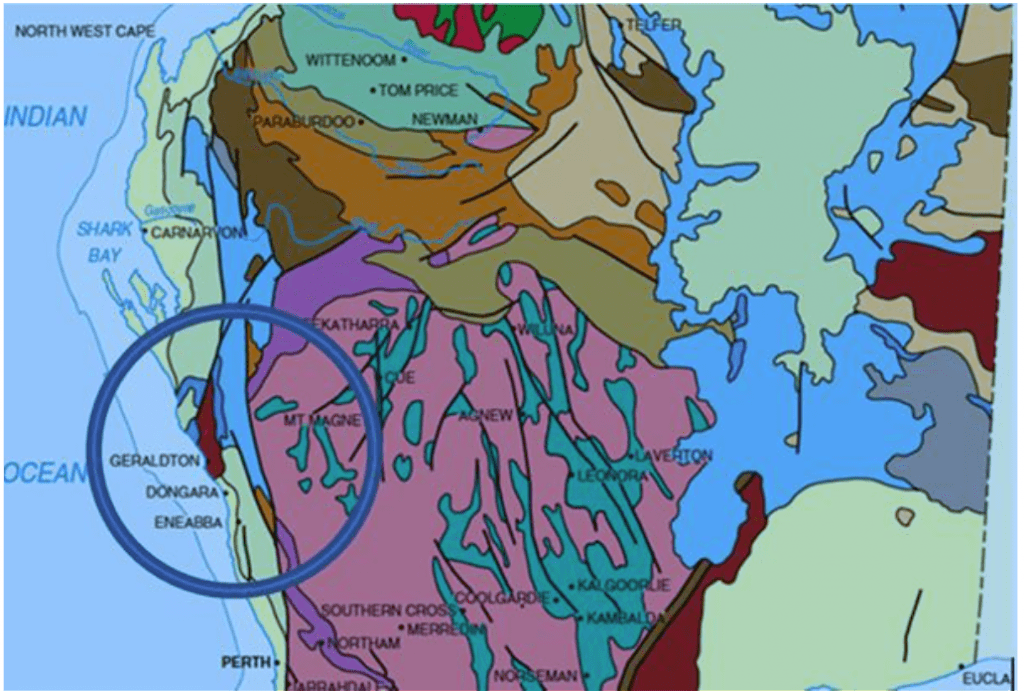 WA’s Batavia coast, centred on Geraldton and Shark Bay
WA’s Batavia coast, centred on Geraldton and Shark Bay
This area possesses a remarkable array of geological landscapes and rock and mineral formations. These include some of the oldest rocks at Jack Hills (dating back 4.4 billion years) to some of the youngest, with fossilised reef formations perched along our coast from just ~10 thousand years ago when sea levels were higher than at present. Banded iron-formations inland, ancient marine ammonite beds, glacial deposits, dinosaur bones, copper, lead and other ores, garnet dunes and stunning landscapes add even more to the geodiversity of the region and the reasons to establish a Geotrail.
How can you help? The Batavia Coast Maritime Heritage Association will convene a meeting of interested individuals and organisations in early 2017 to discuss this proposal and all interested parties are invited to attend. To find out more download this brochure.
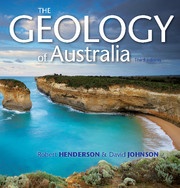 The Geology of Australia by Robert Henderson and David Johnson brings geoscience to the general public in an intelligent and well written account of Australia’s evolution, tectonics, geology and landscape.
The Geology of Australia by Robert Henderson and David Johnson brings geoscience to the general public in an intelligent and well written account of Australia’s evolution, tectonics, geology and landscape.
The book presents the story of the geological evolution of the Australian Plate to readers willing to come to terms with the language of this science without being drowned in unnecessary jargon.
While this is not a textbook for senior high school students or undergraduates it is a valuable addition to the teaching resources used at both secondary and tertiary levels and there should be at least one copy of this edition on the library shelves of all high school, public and university libraries. Teachers and students will find the many Australia-wide examples referenced in the text and figures (over 300 in all) a refreshing change from the usual examples found in texts produced for a North American or European market. This is an excellent book for those looking for the ideal gift for that hard to please person on their list, for those wanting to know more about the Australia around them but who don’t have the technical knowledge required by textbooks and for those teachers and students looking for excellent explanations and diagrams with an Australian context.
Find out more about this book from Cambridge University Press.
Earth Science Western Australia’s popular Exploring Earth and Environmental Science textbook has undergone a major revision for the Australian Curriculum.
The textbook is now split into two 250 page full colour volumes covering the Australian Curriculum in depth. Exploring Earth and Environmental Science, Year 11 and Exploring Earth and Environmental Science, Year 12, can be purchased from ESWA for $60 per volume (this includes GST and postage) for delivery prior to the new school year. Many schools across Australian have already placed pre-orders.
Place your orders via the ESWA web site.
QCoal Foundation Scholarships at James Cook University are open for applications.
The QCoal Foundation supports initiatives that are focused on health, liveability and education in rural and remote Queensland communities. In particular, the Foundation is helping provide a pathway for rural and remote students to attend university, and has partnered with JCU to provide the scholarship.
Recipients will receive $10,000 each year to help them through three years of study. The scholarship is open to undergraduate students who completed Year 12 within two years prior to studying at JCU and preference will be given to geology or science (excluding marine biology) students.
Applications close on 31 January, 2017.
Find out more here.

Geoscience Radio is a podcast about discovery. For those involved in exploration, this is a podcast to showcase mineral discoveries and share insight into the geoscience that is involved in the process. We will delve into some of the basic (and often undervalued) principles of geology that are indispensable tools to the modern geologist, and discuss modern technologies that are becoming commonplace in 21st century exploration.
The podcast series is the work of Perth-based exploration geologist Ben Walsh.
A science graduate from the University of Otago, New Zealand, Ben developed his interest in geology from a young age, experiencing first hand what it means to live in the ‘shaky isles’. Graduating in 2011 with a double major in Geology and Botany, Ben has spent his years so far working in mineral exploration, searching exclusively for metamorphic vein and unconformity-type uranium deposits in Australia.
Episode 1 tells the story of the discovery of WA’s Tropicana gold deposit. You can subscribe to the podcast via iTunes or listen to podcasts via the Geoscience Radio website.